Govt jobs or protests? Nitish Kumar asks Bihar to choose

Leader of opposition in Bihar Assembly, Tejashwi Yadav criticised the Nitish Kumar government over new order by the police against protests
Within days of news that Uttarakhand Police were going to keep track of ‘anti-national’ social media posts while conducting police verification for passport applications, reports emerged from Bihar indicating that the state government had apparently decided to go even further.
An order, issued on February 1, 2021, by Bihar Police warns that police verification not just for passports but also for appointment to government posts, getting bank loans and more, could be affected by a person’s involvement in protests.
Soon after the order’s release RJD chief and leader of opposition in Bihar Assembly Tejashwi Yadav criticised the Nitish Kumar government and called the move ‘undemocratic’. “Bihar CM Nitish Kumar is daring to challenge Mussolini and Hitler with the new directive of depriving those who take part in protests from government jobs and government contracts,” he tweeted.
However, it is not just the opposition parties, but also the common people of the state who feel that the new order is an infringement of their democratic rights to protest.
“This is a vague order and is pointed towards seeking out individuals with a dissenting view,” Amandeep Bishnoi, a teacher in a private school in Bihar’s capital Patna tells Media India Group. Bishnoi had been an active participant in the anti CAA protests in the city, in December 2019.
The Bihar Police have sought to clarify that the order does not curb the democratic right to protest and it intended only to check involvement in criminal activities during a protest. With legal provisions already there for dealing with criminal activities, the police’s justification is far from convincing to many.
The fresh diktat comes close on the heels of another order by Bihar government in mid-January, warning those who put offensive posts on social media about leaders, particularly ministers, legislators, MPs and senior officers in the state.
“This is a step by step planned measure to curb agitations of all forms. First they asked people to not post anything against the government online and now they are curbing our right to protest on ground too,” says Bishnoi.
Geeta Vyas, a 46-year-old associate professor of Political Science at Patna University is also worried about the order.
She points out that while the order from Bihar police does appear to indicate that mere involvement in protest movements will itself not be ground to create objections, the person should have indulged in criminal activity during the protest and named in a police charge sheet, but says that Bihar home department circular dated January 29, which this police order cites, does not make a reference to criminal involvement.
“If anyone is found to be involved in a law and order situation, staging protest, road blockade etc., and in a criminal act against which police files a chargesheet, that can be clearly mentioned in his certificate of conduct and character. These persons should be ready for grave consequences because they will not get government jobs and contracts,” said a State police directive issued on January 30.
Character verification has been made mandatory in government contracts in Bihar. This requires police verification for a number of documents such as passports, arms licences, government contracts, petrol pumps, gas agencies, or government assistance to NGOs.
Vyas claims that the order is an encroachment on the democratic rights of the common citizens of the state by threatening them. “How can a government issue such directives to frighten and stop people from staging protests and dharnas,” she asks.
Tulsi Chaudhary, an advocate of the Patna High Court, also feels that as words like ‘anti-national’ and ‘offensive’ are not clearly defined in the order; it can easily become a tool of misuse of power in the hands of the police.
“There is little doubt that the diktat has been issued to threaten those agitating against the government. In the light of this, such a strong government diktat is beyond one’s comprehension,” says Chaudhary.
She adds that for a state whose chief minister owes his eminence in public life to the mass movement that began against the emergency in 1970s to endorse an order that says those participating in violent protests, blocking roads will find it difficult to get government jobs or passports sounds insane.
“Governments need to be circumspect in the exercise of their powers when it comes to the life of an ordinary citizen,” she adds.









